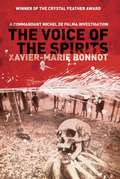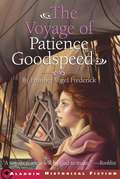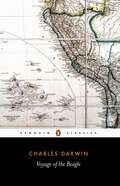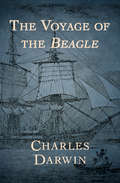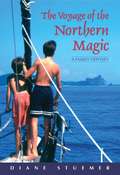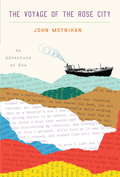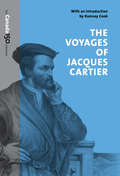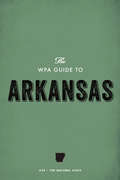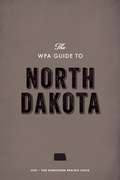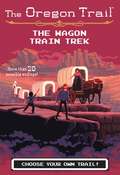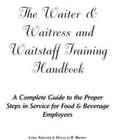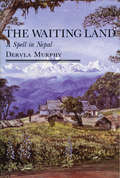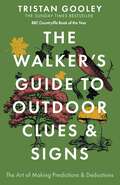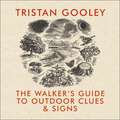- Table View
- List View
The Voice of the Spirits: A Commandant Michel de Palma Investigation
by Xavier-Marie BonnotCommandant Michel de Palma follows an anonymous tip-off to a gated mansion by the coast and finds a body whose face is obscured by a fearsome tribal mask. Beneath it is a mysterious wound that could not have been caused by a bullet. Surrounded by scores of masks and painted skulls, de Palma hears the haunting strains of a primal flute from the floors above. With few leads to go on, de Palma delves into an account of the murdered doctor's voyage to Papua New Guinea seventy years earlier. But when his chief suspect is found dead, killed by the same method as Delorme, he begins to wonder whether the bodies on his hands are not the victims of spirits intent on revenge.
The Voyage
by Murray BailFrank Delage, a middle-aged Australian, arrives in Vienna with the most daring of propositions. He has invented a revolutionary piano and means to market it to the grand old world of classical music. A chance meeting with one Amalia von Schalla brings new possibilities - a soirée, an introduction to her daughter Elisabeth, dinner with an avant-garde composer. But when the sheer audacity of his campaign dawns on him, he takes a slow boat home to the southern hemisphere. As it meanders through the Mediterranean and the Suez Canal, he is afforded ample time to reflect on tensions between the old world and the new. And, for all his travails, he is not going home empty-handed...
The Voyage
by Murray BailFrank Delage, a middle-aged Australian, arrives in Vienna with the most daring of propositions. He has invented a revolutionary piano and means to market it to the grand old world of classical music. A chance meeting with one Amalia von Schalla brings new possibilities - a soirée, an introduction to her daughter Elisabeth, dinner with an avant-garde composer. But when the sheer audacity of his campaign dawns on him, he takes a slow boat home to the southern hemisphere. As it meanders through the Mediterranean and the Suez Canal, he is afforded ample time to reflect on tensions between the old world and the new. And, for all his travails, he is not going home empty-handed...
The Voyage of Patience Goodspeed
by Heather Vogel FrederickOctober 1835. Patience Goodspeed, almost thirteen years old, departs from Nantucket aboard her father's whaling ship. Between kitchen duty and whale blubber stench, this voyage is far from a pleasure cruise. At least Papa lets Patience assist the ship's navigator since she's so good at calculations. But the smooth sailing doesn't last long. Mutinous mates maroon most of the crew, including Patience's father and brother, on a deserted island. Can Patience rescue everyone before it's too late?
The Voyage of the Beagle
by Charles Darwin"The Voyage of the Beagle" is Charles Darwin's account of the momentous voyage which set in motion the current of intellectual events leading to "The Origin of Species".
The Voyage of the Beagle
by Charles DarwinWhen HMS Beagle sailed out of Devonport on 27 December 1831, Charles Darwin was twenty-two and setting off on the voyage of a lifetime. His journal, here reprinted in a shortened form, shows a naturalist making patient observations concerning geology, natural history, people, places and events. Volcanoes in the Galapagos, the Gossamer spider of Patagonia and the Australasian coral reefs – all are to be found in these extraordinary writings. The insights made here were to set in motion the intellectual currents that led to the most controversial book of the Victorian age: The Origin of Species.
The Voyage of the Beagle: Journal Of Researches Into The Natural History And Geology Of The Countries Visited During The Voyage Of H. M. S. Beagle Round The World
by Charles DarwinThe riveting firsthand account of the historic voyage that led to the theory of evolution When the HMS Beagle set sail in 1831, the science of biology was not far removed from the Dark Ages. When the ship returned to England nearly five years later, Charles Darwin had the makings of a theory that would revolutionize our understanding of the natural world. From volcanoes in the Galapagos to the coral reefs of Australia, The Voyage of the Beagle documents the young naturalist&’s encounters with some of the earth&’s most stunning features. Darwin&’s observations of the people, places, and events he experienced make for compelling reading and offer a fascinating window into the intellectual development of his ideas about natural selection. A brilliant travelogue and a revealing glimpse into the Victorian mindset, The Voyage of the Beagle is an indispensable companion volume to On the Origin of Species. This ebook has been professionally proofread to ensure accuracy and readability on all devices.
The Voyage of the Northern Magic: A Family Odyssey
by Diane StuemerEver dream of selling up and running away to sea? Diane Stuemer and her husband, Herbert, were once a typical suburban couple entering middle age, with a comfortable home and three boys under twelve. A year later they had sold their business, rented out their house, and were setting out to circumnavigate the globe in a 40-year-old yacht. Their entire sailing experience consisted of six afternoons on the Ottawa River. Over the next four years, squeezed into quarters no bigger than the Stuemers’ old bedroom, the family of five would become seasoned mariners. They would battle deadly storms at sea and evade real-life pirates. Dodge waterspouts and lightning strikes and witness the bombing of the USSCole. See the staggering beauty of Borneo’s rainforest, and its destruction from logging. Be arrested at gunpoint and entertained like visiting royalty. In all, they would visit 34 countries and cover 35,000 nautical miles. Almost everywhere they went, the family made lasting friendships. They learned to trust each other and embrace opportunity, and in Kenya they learned the true meaning of humanity. As Northern Magicpushed onward, many thousands followed the family’s progress in Diane’s dispatches to the Ottawa Citizen, and thousands more turned out to cheer when the amazing Stuemers came home. From the Hardcover edition.
The Voyage of the Rose City: An Adventure at Sea
by John MoynihanA gripping, beautifully told story of a young man's coming-of-age at sea When John Moynihan decided to ship out in the Merchant Marine during the summer of his junior year at Wesleyan University, his father, Senator Daniel Patrick Moynihan, was not enthusiastic: As a young man, before joining the U.S. Navy, Pat Moynihan had worked the New York City docks and knew what his son would encounter. However, John's mother, Elizabeth, an avid sailor, found the idea of an adventure at sea exciting and set out to help him get his Seaman's Papers. When John was sworn in, he was given one piece of advice: to not tell the crew that his father was a United States senator.The job ticket read "forty-five days from Camden, New Jersey, to the Mediterranean on the Rose City," a supertanker. As the ship sailed the orders changed, and forty-five days became four months across the equator, around Africa, across the Indian Ocean, and up to Japan--a far more perilous voyage than John or his mother had imagined. The physical labor was grueling, and outdated machinery aboard the ship, including broken radar, jeopardized the lives of the crew. They passed through the Straits of Malacca three times, with hazardous sailing conditions and threats of pirates. But it was also the trip of a lifetime: John reveled in the natural world around him, listened avidly to the tales of the old timers, and even came to value the drunken camaraderie among men whose only real family was one another. A talented artist, John drew what he saw and kept a journal on the ship that he turned into his senior thesis when he returned to Wesleyan the following year.A few years after John died in his early forties, the result of a reaction to acetaminophen, his mother printed a limited edition of his journal illustrated with drawings from his notebooks. Encouraged by the interest in his account of the voyage, she agreed to publish the book more widely. An honestly written story of a boy's coming into manhood at sea, The Voyage of the Rose City is a taut, thrilling tale of the adventure of a lifetime.From the Hardcover edition.
The Voyages of Captain James Cook: The Illustrated Accounts of Three Epic Voyages
by James King John Hawkesworth James Cook Georg ForsterThe first-ever illustrated account of the explorer and cartographer’s epic eighteenth-century Pacific voyages, complete with excerpts from his journals.This is history’s greatest adventure story. In 1766, the Royal Society chose prodigal mapmaker and navigator James Cook to lead a South Pacific voyage. His orders were to chart the path of Venus across the sun. That task completed, his ship, the HMS Endeavour, continued to comb the southern hemisphere for the imagined continent Terra Australis. The voyage lasted from 1768 to 1771, and upon Cook’s return to London, his journaled accounts of the expedition made him a celebrity. After that came two more voyages for Cook and his crew—followed by Cook’s murder by natives in Hawaii. The Voyages of Captain James Cook reveals Cook’s fascinating story through journal excerpts, illustrations, photography, and supplementary writings.During Cook’s career, he logged more than 200,000 miles—nearly the distance to the moon. And along the way, scientists and artists traveling with him documented exotic flora and fauna, untouched landscapes, indigenous peoples, and much more. In addition to the South Pacific, Cook’s voyages took him to South America, Antarctica, New Zealand, the Pacific Coast from California to Alaska, the Arctic Circle, Siberia, the East Indies, and the Indian Ocean. When he set out in 1768, more than one-third of the globe was unmapped. By the time Cook died in 1779, he had created charts so accurate that some were used into the 1990s.The Voyages of Captain James Cook is a handsome illustrated edition of Cook’s selected writings spanning his Pacific voyages, ending in 1779 with the delivery of his salted scalp and hands to his surviving crewmembers. It’s an enthralling read for anyone who appreciates history, science, art, and classic adventure.
The Voyages of Jacques Cartier
by Ramsay CookJacques Cartier's voyages of 1534, 1535, and 1541constitute the first record of European impressions of the St Lawrence region of northeastern North American and its peoples. The Voyages are rich in details about almost every aspect of the region's environment and the people who inhabited it.As Ramsay Cook points out in his introduction, Cartier was more than an explorer; he was also Canada's first ethnographer. His accounts provide a wealth of information about the native people of the region and their relations with each other. Indirectly, he also reveals much about himself and about sixteenth-century European attitudes and beliefs. These memoirs recount not only the French experience with the Iroquois, but alo the Iroquois' discovery of the French.In addition to Cartier's Voyages, a slightly amended version of H.P. Biggar's 1924 text, the volume includes a series of letters relating to Cartier and the Sieur de Roberval, who was in command of cartier on the last voyage. Many of these letters appear for the first time in English.Ramsay Cook's introduction, 'Donnacona Discovers Europe,' rereads the documents in the light of recent scholarship as well as from contemporary perspectives in order to understand better the viewpoints of Cartier and the native people with whom he came into contact.
The WPA Guide to Alabama
by Federal Writers' ProjectDuring the 1930s in the United States, the Works Progress Administration developed the Federal Writers’ Project to support writers and artists while making a national effort to document the country’s shared history and culture. The American Guide series consists of individual guides to each of the states. Little-known authors#151;many of whom would later become celebrated literary figures#151;were commissioned to write these important books. John Steinbeck, Saul Bellow, Zora Neale Hurston, and Ralph Ellison are among the more than 6,000 writers, editors, historians, and researchers who documented this celebration of local histories. Photographs, drawings, driving tours, detailed descriptions of towns, and rich cultural details exhibit each state’s unique flavor. The WPA Guide to Alabama takes the reader on a journey of through the heart of Dixie, from the Gulf coast to the rich Black Belt region and the scenic Cumberland Plateau. First published in 1941, the guide goes beyond the popular images of cotton fields and plantation houses of the old south and brings to light the #147;magic” of Birmingham’s burgeoning manufacturing industry, the vibrant university life in Tuscaloosa, and, in Mobile, the cultural diversity of Alabama’s port city. The guide includes striking photos of Southern poverty during the Depression.
The WPA Guide to Arizona
by Federal Writers' ProjectDuring the 1930s in the United States, the Works Progress Administration developed the Federal Writers’ Project to support writers and artists while making a national effort to document the country’s shared history and culture. The American Guide series consists of individual guides to each of the states. Little-known authors-many of whom would later become celebrated literary figures-were commissioned to write these important books. John Steinbeck, Saul Bellow, Zora Neale Hurston, and Ralph Ellison are among the more than 6,000 writers, editors, historians, and researchers who documented this celebration of local histories. Photographs, drawings, driving tours, detailed descriptions of towns, and rich cultural details exhibit each state’s unique flavor. At the time of the publication of the WPA Guide to Arizona in 1940, the Grand Canyon State was the newest addition to the union. The guide presents a state of contrasts, both geographically and culturally. The photographs show many facets of the state-from the mesas and desert lands to the Spanish missions and Native American art.
The WPA Guide to Arkansas
by Federal Writers' ProjectDuring the 1930s in the United States, the Works Progress Administration developed the Federal Writers’ Project to support writers and artists while making a national effort to document the country’s shared history and culture. The American Guide series consists of individual guides to each of the states. Little-known authors#151;many of whom would later become celebrated literary figures#151;were commissioned to write these important books. John Steinbeck, Saul Bellow, Zora Neale Hurston, and Ralph Ellison are among the more than 6,000 writers, editors, historians, and researchers who documented this celebration of local histories. Photographs, drawings, driving tours, detailed descriptions of towns, and rich cultural details exhibit each state’s unique flavor. Published in 1941, the WPA Guide to Arkansas splendidly exhibits the varied environment of the Natural State. From the densely forested land in the Ozark Mountains and Arkansas Timberlands to the Mississippi River and the Arkansas Delta, the guide to the Land of Opportunity provides several photographs of, history on, and driving tours through the state’s grand geography.
The WPA Guide to North Dakota
by Federal Writers' ProjectDuring the 1930s in the United States, the Works Progress Administration developed the Federal Writers' Project to support writers and artists while making a national effort to document the country's shared history and culture. The American Guide series consists of individual guides to each of the states. Little-known authors-many of whom would later become celebrated literary figures-were commissioned to write these important books. John Steinbeck, Saul Bellow, Zora Neale Hurston, and Ralph Ellison are among the more than 6,000 writers, editors, historians, and researchers who documented this celebration of local histories. Photographs, drawings, driving tours, detailed descriptions of towns, and rich cultural details exhibit each state's unique flavor.According to the WPA Guide to North Dakota, there is more to the Northern Prairie State than meets the eye. Primarily an agricultural state, cattle ranching and the pioneer spirit are ever-present in this guide. Also, beautiful photographs of the Great Plains make this a visually pleasing guide the Peace Garden State.
The Wages Of History: Emotional Labor On Public History's Front Lines (Public History In Historical Perspective Ser.)
by Amy M. TysonAnyone who has encountered costumed workers at a living history museum may well have wondered what their jobs are like, churning butter or firing muskets while dressed in period clothing. In The Wages of History, Amy Tyson enters the world of the public history interpreters at Minnesota's Historic Fort Snelling to investigate how they understand their roles and experience their daily work. Drawing on archival research, personal interviews, and participant observation, she reframes the current discourse on history museums by analyzing interpreters as laborers within the larger service and knowledge economies. <p><p> Although many who are drawn to such work initially see it as a privilege—an opportunity to connect with the public in meaningful ways through the medium of history—the realities of the job almost inevitably alter that view. Not only do interpreters make considerable sacrifices, both emotional and financial, in order to pursue their work, but their sense of special status can lead them to avoid confronting troubling conditions on the job, at times fueling tensions in the workplace. <p> This case study also offers insights—many drawn from the author's seven years of working as an interpreter at Fort Snelling—into the way gendered roles and behaviors from the past play out among the workers, the importance of creative autonomy to historical interpreters, and the ways those on public history's front lines both resist and embrace the site's more difficult and painful histories relating to slavery and American Indian genocide.
The Wagon Train Trek (The Oregon Trail)
by Jesse WileyKeep your wagon train alive in this trailblazing choose-your-own-trail experience on the Oregon Trail! With more than twenty possible endings, there are wild animals, rapid rivers, bandits, treacherous weather, famine, and even death that stand between you and your dream life out West. Do you have what it takes to make it all the way to Oregon City? In this exciting choose-your-own-trail stand-alone story featuring 8-bit art, it's 1850 and you are leading a whole covered wagon train with your family on a 2,000-mile trek on the Oregon Trail. Wild animals, natural disasters, unpredictable weather, famine, fast-flowing rivers, strangers, and sickness stand in between you and your destination: Oregon City! Do you have the smarts and skills to keep everyone safe and together on the Trail? Which path will get you safely across the country? With twenty-three possible endings, choose wrong and you'll never live out your dreams. Choose right and blaze a trail that gets you closer to Oregon City! Twitter: @oregontrail Facebook: facebook.com/oregontrail/
The Waiter and Waitress and Wait Staff Training Handbook: A Complete Guide to the Proper Steps in Service for Food and Beverage Employees
by Lora Arduser Douglas R. BrownSuitable for various food service serving staff members, this work covers various aspects of restaurant customer service for the positions of host, waiter or waitress, head waiter, captain, and bus person. It provides step-by-step instructions on topics such as hosting, seating guests, taking/filling orders, loading/unloading trays, and others.
The Waiting Land
by Dervla MurphyDervla Murphy describes her various journeys by air, bicycle, and foot in the remote and mountainous Lantang region near Tibet. Written with charm and sensitivity, this book reveals the vitality of an age-old civilization.
The Waiting Land: A Spell in Nepal
by Dervla MurphyThe intrepid traveler’s stories from Nepal. Having settled in a village in the Pokhara Valley to work at a Tibetan refugee camp, Dervla Murphy makes her home in a tiny, vermin-infested room over a stall in the bazaar. In diary form, she describes her various journeys by air, by bicycle, and on foot into the remote and mountainous Lantang region on the border of Tibet. Murphy's charm and sensitivity as a writer and traveler reveal not only the vitality of an age-old civilization facing the challenge of Westernization, but the wonder and excitement of her own remarkable adventures. First published in 1967, The Waiting Land was a difficult book for Dervla. As she said herself: “It was a light-hearted account of an experience that had not been light-hearted.”
The Waiting Land: A Spell in Nepal
by Dervla MurphyThe intrepid traveler's stories from Nepal. Having settled in a village in the Pokhara Valley to work at a Tibetan refugee camp, Dervla Murphy makes her home in a tiny, vermin-infested room over a stall in the bazaar. In diary form, she describes her various journeys by air, by bicycle, and on foot into the remote and mountainous Lantang region on the border of Tibet. Murphy's charm and sensitivity as a writer and traveler reveal not only the vitality of an age-old civilization facing the challenge of Westernization, but the wonder and excitement of her own remarkable adventures. First published in 1967, The Waiting Land was a difficult book for Dervla. As she said herself: "It was a light-hearted account of an experience that had not been light-hearted."
The Wake of the Unseen Object: Travels through Alaska's Native Landscapes (Classic Reprint Series)
by Tom KizziaA journey to Alaska’s remote roadless villages, during a time of great historical transition, brings us this enduring portrait of a place and its people. Alutiiq, Yup’ik, Inupiaq, and Athabascan subjects reveal themselves as entirely contemporary individuals with deep longings and connection to the land and to their past. Tom Kizzia’s account of his travels off the Alaska road system, first published in 1991, has endured with a sterling reputation for its thoughtful, poetic, unflinching engagement with the complexity of Alaska’s rural communities. Wake of the Unseen Object is now considered some of the finest nonfiction writing about Alaska. This new edition includes an updated introduction by the author, looking at what remains the same after thirty years and what is different—both in Alaska, and in the expectations placed on a reporter visiting from another world.
The Walker's Guide to Outdoor Clues and Signs: Explore the great outdoors from your armchair
by Tristan Gooley'It's like being given some sort of magical text... eye-opening and invaluable.' India Knight, Sunday Times'Even the intrepid Bear Grylls could learn a trick or two from this book' The TimesThe ultimate guide to what the land, sun, moon, stars, trees, plants, animals, sky and clouds can reveal - when you know what to look for. Includes over 850 outdoor clues and signs for you to enjoy the wonders of the outdoors from your living room. This top ten bestseller is the result of Tristan Gooley's two decades of pioneering outdoors experience and six years of instructing, researching and writing. It includes lots of outdoor clues and signs that will not be found in any other book in the world. As well as the most comprehensive guide to natural navigation for walkers ever compiled, it also contains clues for weather forecasting, tracking, city walks, coast walks, night walks and dozens of other areas.
The Walker's Guide to Outdoor Clues and Signs: Their Meaning and the Art of Making Predictions and Deductions
by Tristan Gooley**From the bestselling author of THE NATURAL EXPLORER and HOW TO READ WATER, the Sunday Times Book Of The Year**2015 BBC Countryfile Magazine Country Book of the Year and winner of the Outdoor Book of the Year at The Great Outdoors Awards 2015'Even the intrepid Bear Grylls could learn a trick or two from this book' The TimesThe ultimate guide to what the land, sun, moon, stars, trees, plants, animals, sky and clouds can reveal - when you know what to look for. Includes over 850 outdoor clues and signs. This top ten bestseller is the result of Tristan Gooley's two decades of pioneering outdoors experience and six years of instructing, researching and writing. It includes lots of outdoor clues and signs that will not be found in any other book in the world. As well as the most comprehensive guide to natural navigation for walkers ever compiled, it also contains clues for weather forecasting, tracking, city walks, coast walks, night walks and dozens of other areas.(P)2019 Hodder & Stoughton Limited
